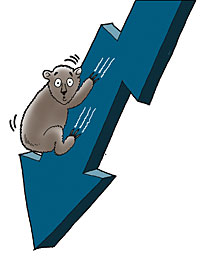 BILASH RAI |
This Beed vividly remembers conversations with friends trying to go to Nagarkot on the eve of 1st January 2000. Everyone around the world was concerned about Y2K, and what the 21st century would be like. India discovered its IT back office potential and its economy boomed. In Nepal, though, it seems the clock stood still despite the political upheavals of the period 1990-2000.
Of course, we saw the liberalisation of the telecom sector, a boom in the real estate and financial sectors fed by speculative and unregulated investments, the surge in remittances as more people left, the increase in FM radio stations and television channels, and the rise of private education firms and educational consulting services. But despite all this, GDP growth has been lower than inflation.
Hotels are in worse shape than they were a decade ago. While tourist arrivals have inched up, Thamel's once wholesome night life is now overrun by dance bars and prostitution. Tourist taxis haven't changed, and Nepalis still can't ride the comfortable Greenline buses.
As the number of loadshedding hours has climbed and most households have gotten generators, NEA has been reduced to a backup power source. The same people pen op-eds and speak at hydropower seminars, which remain venues for effusive promise making, even as Nepal has dropped to the bottom five in terms of electricity consumption.
While the world has moved on to televisions on mobile phones and through satellite dishes, we still have the same set of operators who can't even deliver with generators despite signing 24 hour delivery contracts with their customers. The fact that no customer complains speaks volumes about the apathy of people towards service delivery.
Similarly there has been no addition to the stock of petroleum products for the valley and the lead stock has dwindled to just five days. Gas stations keep on making money by either hoarding or selling adulterated stuff. Most haven't even bothered to change their old analogue dispensing pumps.
While flights have increased, the airport remains the same, there are fewer luggage carts per passenger today than ten years ago and still only two queues to get through security. The national flag carrier continues to operate with one-and-a-half aircrafts (two aircrafts with three engines) and the airport buses are the same as well, with Indian Airlines buses still sporting West Bengal number plates. Indeed, the airport exemplifies just how little has been achieved this past decade.
Private sector businessmen have gone from courting political leaders, to flattering the King when he took control, to fighting with one another on planes to sit next to Pushpa Kamal Dahal. They still believe that proximity to power rather than professionalism leads to success.
If there was anything that boomed it was the development sector. A swarm of development consultants rushed into Kathmandu as NGOs mushroomed, keeping hotels abuzz with seminars, workshops and conferences. Compared to 2000, surely we have more per capita reports! We have now more people talking about transparency and governance, while their own organisations don't have either. We have more junkets organised, more bhatta (per diem) expended and as one nationalist asked the Beed: why do more and more expatriate development workers choose to have babies in Nepal?
But this Beed has sincere hopes and expectations that the column on 27 December 2019 will have a different take. And not just because it is necessary to live up to the dreams outlined in my book Unleashing Nepal, but because of the strong conviction that people now feel thatpolitics needn't hinder economic development, so long as the youth step up to the plate.



